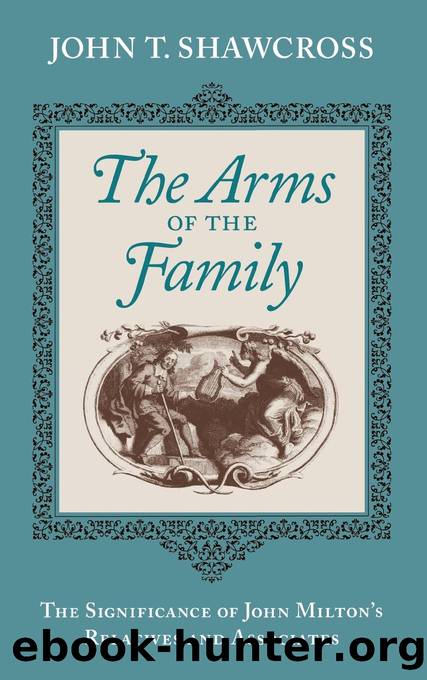The Arms of the Family by Shawcross John T.;

Author:Shawcross, John T.; [Shawcross, John T.]
Language: eng
Format: epub
Publisher: University Press of Kentucky
Published: 2021-08-15T00:00:00+00:00
3
The evidence of Tenure and Eikonoklastes in 1649 has not always been recognized: Milton argues against what he and others classified as tyranny and thus against Charles Iâs misuse of power. Tenure discusses kings AND magistrates, and Eikonoklastes is aimed at refuting Eikon Basilike and the idolatry for Charles, not Charles per se. As cited above, he admonished Cromwell that âCertainly you yourself cannot be free without usâ and that there was need to admit others âto the first share in your counsels.â He does not argue against kingship (or the latter-day Protectorate), nor against kings: he argues against tyranny, which a Protector could exhibit as much as any king. Norbrookâs reminder is most important for us to understand: âMiltonâs God, then, is a king with distinct overtones of a republican founding legislator. He is a king neverthelessâ ( Writing the English Republic, 477).46 Even Algernon Sidney, who ran afoul of Cromwell because of his strong republican demands, and who was executed in 1683 for his part in the Rye House Plot, maintained that âNothing is farther from my intention than to speak irreverently of kings,â and he quoted sentences from Miltonâs Tenure in his Very Copy of a Paper Delivered to the Sheriffs upon the scaffold on Tower Hill.
While Miltonâs argument in Tenure often finds substance in Aristotleâs Ethics, Book VIII, and Politics, Books III-V, there seems to be no specific influence from Machiavelliâs Art of War or the Discorsi.47 Between 1640 and 1642, he is struck by Machiavelliâs preference of a commonwealth to a monarchy and observation that âkingdoms that have good rule do not give their kings absolute powerââideas consonant with this earlier political tract. During the years 1651â1652, after there has been some experience with the Commonwealth but before the troubles associated with the Protectorate, he records, among other items, that Machiavelli prefers a republican form of government since it makes fewer mistakes than a prince does in choosing its magistrates or councillors, since a republic may enact good laws and reduce magistrates to the ranks of ordinary citizens, and since controls are restored to the people (CPB, 198). Yet Milton did not actively seek âto argue for the English republic in terms derived either from classical models or from Machiavellian political theory.â48 Quentin Skinnerâs examination of the question concludes that other writersâand this is not in opposition to Cornsâs statement concerning Milton just givenâattest that âthe best form of constitution for a commune or civitas must be of an elective as opposed to a monarchical characterâ and that âgovernment by hereditary princes or Signori must at all costs be avoided; some form of elective and self-governing system must always be maintained.â49 These views of the meanings derived from Machiavelliâs work and of Miltonâs position do not remove single person rule from acceptance, and thus we can understand his acceptance of the Protectorate in 1653, and the continued possibility of a monarch governing in the public interest in the first edition of The Ready and Easy Way (compare Corns).
Download
This site does not store any files on its server. We only index and link to content provided by other sites. Please contact the content providers to delete copyright contents if any and email us, we'll remove relevant links or contents immediately.
4 3 2 1: A Novel by Paul Auster(11788)
The handmaid's tale by Margaret Atwood(7447)
Giovanni's Room by James Baldwin(6808)
Asking the Right Questions: A Guide to Critical Thinking by M. Neil Browne & Stuart M. Keeley(5355)
Big Magic: Creative Living Beyond Fear by Elizabeth Gilbert(5351)
Ego Is the Enemy by Ryan Holiday(4956)
On Writing A Memoir of the Craft by Stephen King(4662)
The Body: A Guide for Occupants by Bill Bryson(4581)
Ken Follett - World without end by Ken Follett(4443)
Bluets by Maggie Nelson(4261)
Adulting by Kelly Williams Brown(4232)
Eat That Frog! by Brian Tracy(4149)
Guilty Pleasures by Laurell K Hamilton(4116)
White Noise - A Novel by Don DeLillo(3829)
The Poetry of Pablo Neruda by Pablo Neruda(3814)
Fingerprints of the Gods by Graham Hancock(3738)
Alive: The Story of the Andes Survivors by Piers Paul Read(3730)
The Book of Joy by Dalai Lama(3697)
The Bookshop by Penelope Fitzgerald(3619)
